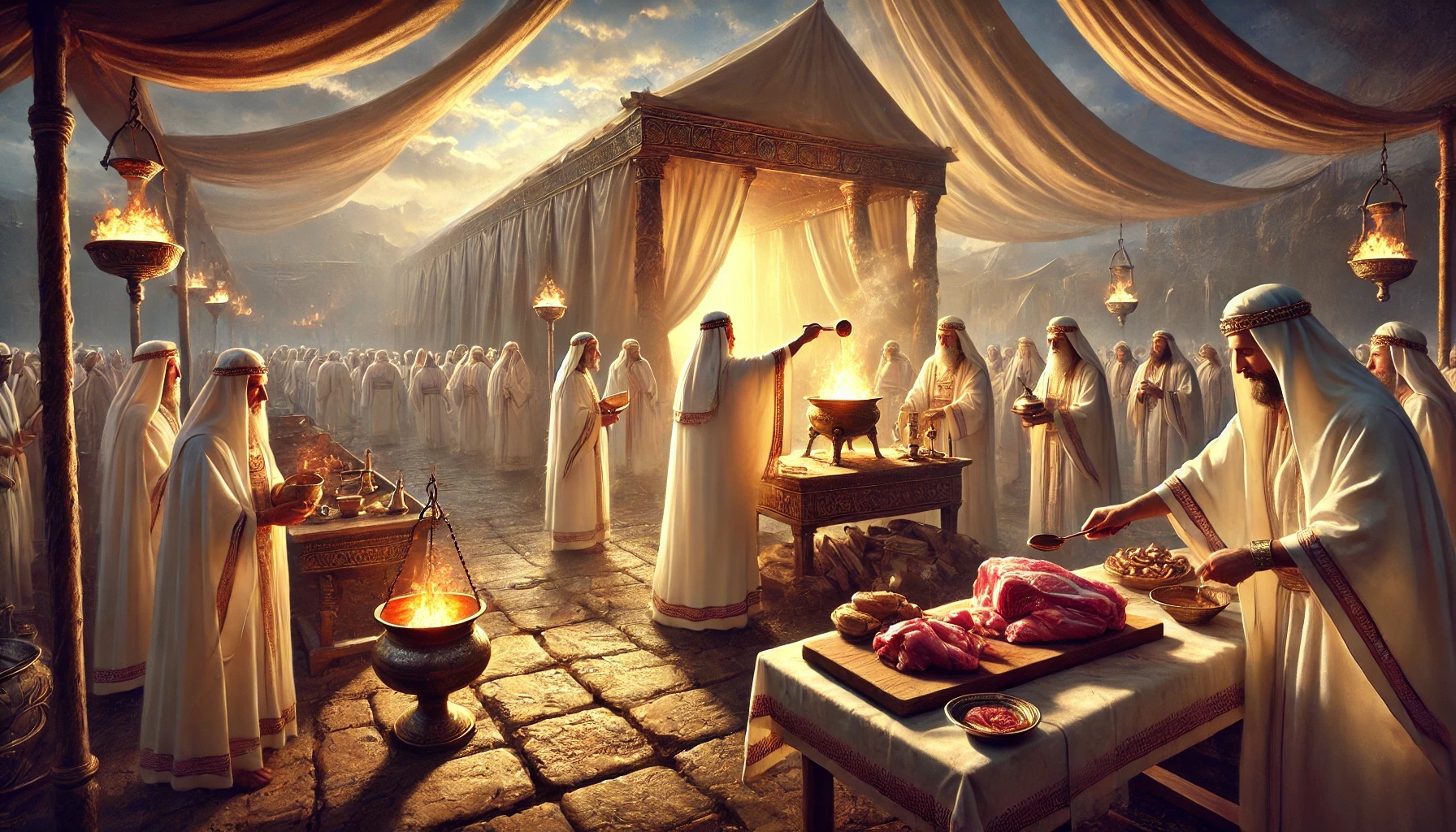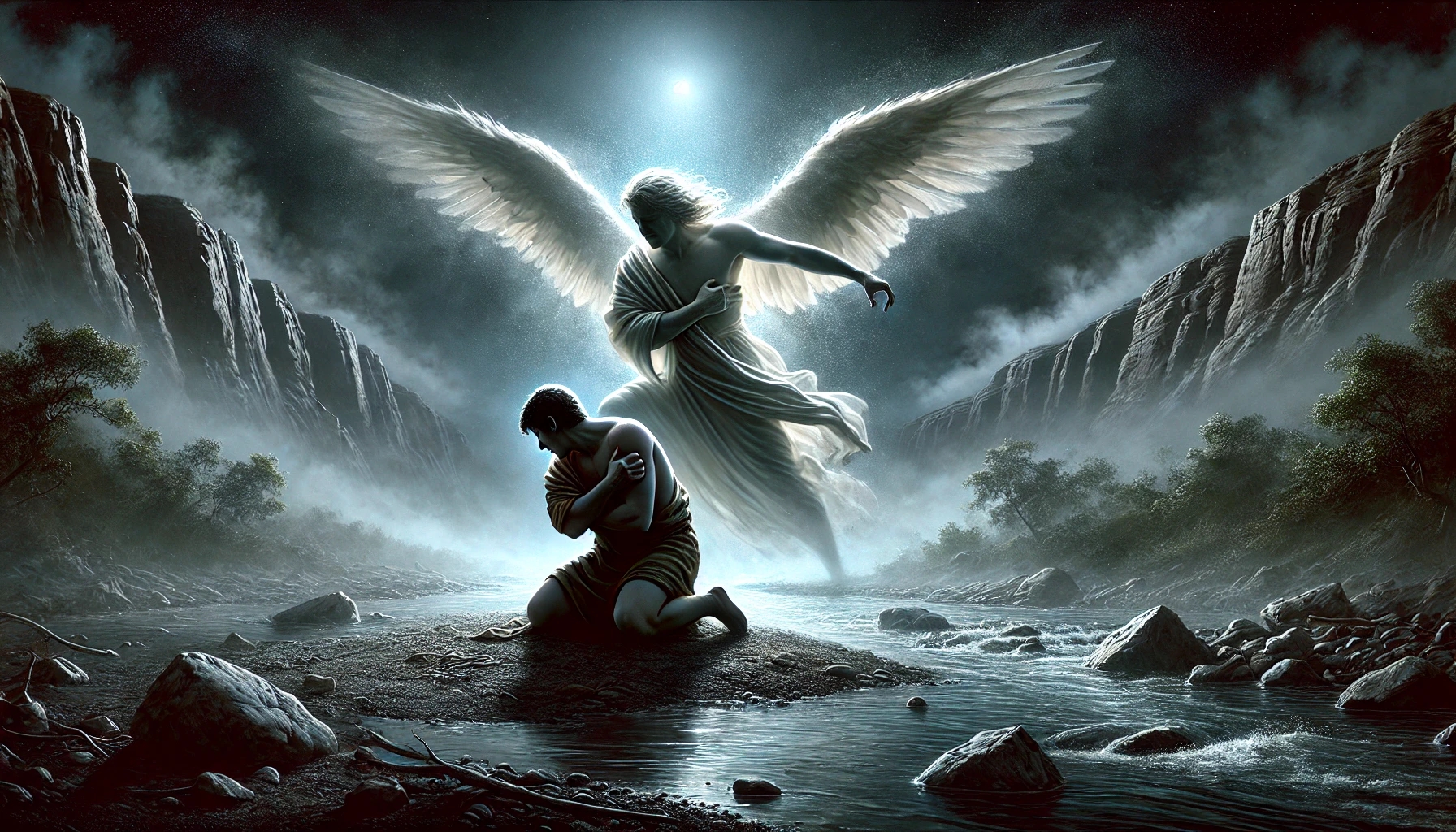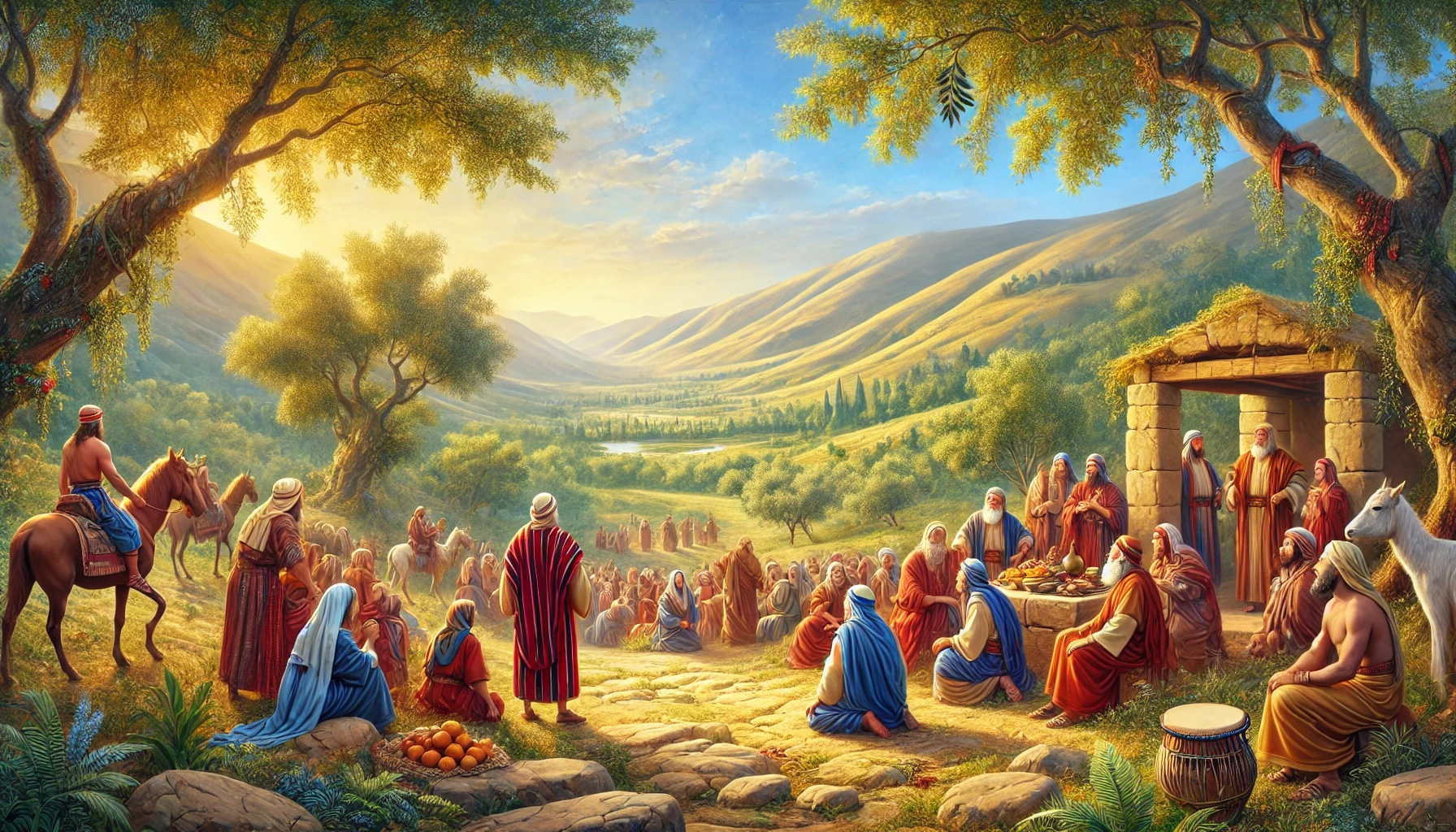
📅 July 22, 2025
📖 DAILY BIBLE READING
✨ Leviticus 7 – Sacred Order and Voluntary Obedience
🔥 The Sacrificial Laws and Their Spiritual Significance
══════════════════════════════════════════════
📜 Bible Text – Leviticus 7 (KJV)
1 Likewise this is the law of the trespass offering: it is most holy.
2 In the place where they kill the burnt offering shall they kill the trespass offering: and the blood thereof shall he sprinkle round about upon the altar.
3 And he shall offer of it all the fat thereof; the rump, and the fat that covereth the inwards,
4 And the two kidneys, and the fat that is on them, which is by the flanks, and the caul that is above the liver, with the kidneys, it shall he take away:
5 And the priest shall burn them upon the altar for an offering made by fire unto the Lord: it is a trespass offering.
6 Every male among the priests shall eat thereof: it shall be eaten in the holy place: it is most holy.
7 As the sin offering is, so is the trespass offering: there is one law for them: the priest that maketh atonement therewith shall have it.
8 And the priest that offereth any man’s burnt offering, even the priest shall have to himself the skin of the burnt offering which he hath offered.
9 And all the meat offering that is baken in the oven, and all that is dressed in the fryingpan, and in the pan, shall be the priest’s that offereth it.
10 And every meat offering, mingled with oil, and dry, shall all the sons of Aaron have, one as much as another.
11 And this is the law of the sacrifice of peace offerings, which he shall offer unto the Lord.
12 If he offer it for a thanksgiving, then he shall offer with the sacrifice of thanksgiving unleavened cakes mingled with oil, and unleavened wafers anointed with oil, and cakes mingled with oil, of fine flour, fried.
13 Besides the cakes, he shall offer for his offering leavened bread with the sacrifice of thanksgiving of his peace offerings.
14 And of it he shall offer one out of the whole oblation for an heave offering unto the Lord, and it shall be the priest’s that sprinkleth the blood of the peace offerings.
15 And the flesh of the sacrifice of his peace offerings for thanksgiving shall be eaten the same day that it is offered; he shall not leave any of it until the morning.
16 But if the sacrifice of his offering be a vow, or a voluntary offering, it shall be eaten the same day that he offereth his sacrifice: and on the morrow also the remainder of it shall be eaten:
17 But the remainder of the flesh of the sacrifice on the third day shall be burnt with fire.
18 And if any of the flesh of the sacrifice of his peace offerings be eaten at all on the third day, it shall not be accepted, neither shall it be imputed unto him that offereth it: it shall be an abomination, and the soul that eateth of it shall bear his iniquity.
19 And the flesh that toucheth any unclean thing shall not be eaten; it shall be burnt with fire: and as for the flesh, all that be clean shall eat thereof.
20 But the soul that eateth of the flesh of the sacrifice of peace offerings, that pertain unto the Lord, having his uncleanness upon him, even that soul shall be cut off from his people.
21 Moreover the soul that shall touch any unclean thing, as the uncleanness of man, or any unclean beast, or any abominable unclean thing, and eat of the flesh of the sacrifice of peace offerings, which pertain unto the Lord, even that soul shall be cut off from his people.
22 And the Lord spake unto Moses, saying,
23 Speak unto the children of Israel, saying, Ye shall eat no manner of fat, of ox, or of sheep, or of goat.
24 And the fat of the beast that dieth of itself, and the fat of that which is torn with beasts, may be used in any other use: but ye shall in no wise eat of it.
25 For whosoever eateth the fat of the beast, of which men offer an offering made by fire unto the Lord, even the soul that eateth it shall be cut off from his people.
26 Moreover ye shall eat no manner of blood, whether it be of fowl or of beast, in any of your dwellings.
27 Whatsoever soul it be that eateth any manner of blood, even that soul shall be cut off from his people.
28 And the Lord spake unto Moses, saying,
29 Speak unto the children of Israel, saying, He that offereth the sacrifice of his peace offerings unto the Lord shall bring his oblation unto the Lord of the sacrifice of his peace offerings.
30 His own hands shall bring the offerings of the Lord made by fire, the fat with the breast, it shall he bring, that the breast may be waved for a wave offering before the Lord.
31 And the priest shall burn the fat upon the altar: but the breast shall be Aaron’s and his sons’.
32 And the right shoulder shall ye give unto the priest for an heave offering of the sacrifices of your peace offerings.
33 He among the sons of Aaron, that offereth the blood of the peace offerings, and the fat, shall have the right shoulder for his part.
34 For the wave breast and the heave shoulder have I taken of the children of Israel from off the sacrifices of their peace offerings, and have given them unto Aaron the priest and unto his sons by a statute for ever from among the children of Israel.
35 This is the portion of the anointing of Aaron, and of the anointing of his sons, out of the offerings of the Lord made by fire, in the day when he presented them to minister unto the Lord in the priest’s office;
36 Which the Lord commanded to be given them of the children of Israel, in the day that he anointed them, by a statute for ever throughout their generations.
37 This is the law of the burnt offering, of the meat offering, and of the sin offering, and of the trespass offering, and of the consecrations, and of the sacrifice of the peace offerings;
38 Which the Lord commanded Moses in mount Sinai, in the day that he commanded the children of Israel to offer their oblations unto the Lord, in the wilderness of Sinai.
══════════════════════════════════════════════
🔵 Introduction
Leviticus chapter 7 concludes the detailed instructions regarding sacrifices. It is not just about outward rituals but about deep spiritual principles: holiness, gratitude, responsibility, and divine order.
In a world where sacrifice is often rejected and worship made individualistic, this passage reminds us that God defines how we may approach Him. Each offering reveals something about His nature.
══════════════════════════════════════════════
🟡 Commentary
-
The Guilt Offering (verses 1–10)
-
-
A most holy thing. Like the sin offering, it reveals the seriousness of guilt. Blood is sprinkled, fat is burned – symbols of purification and atonement.
-
Priestly rights: Only male priests may eat it – an expression of sacredness. The priest who performs the burnt offering receives its skin.
→ Spiritual principle: God distinguishes between clean and unclean, guilty and justified.
-
-
The Thank and Fellowship Offering (verses 11–21)
-
-
Unleavened and leavened bread accompany thank offerings – not for sin, but for gratitude, a voluntary act.
-
Timely consumption shows that God values fresh and sincere devotion.
-
Purity is required: Eating while unclean brings exclusion.
→ Spiritual principle: Gratitude is sacred and requires purity of heart.
-
-
The Prohibition of Fat and Blood (verses 22–27)
-
-
Fat is dedicated to the Lord.
-
Blood is the life-force.
→ Spiritual principle: Life belongs to God and cannot be handled carelessly.
-
-
Portions for the Priests (verses 28–36)
-
-
The breast and right shoulder are designated for the priests as wave and heave offerings.
-
God sustains His servants through the offerings of the people.
→ Spiritual principle: Worship is not a solo act – it’s a holy cycle of giving and receiving.
-
-
Conclusion of the Sacrificial Laws (verses 37–38)
-
-
Recap of all offerings:
-
Burnt Offering – Dedication
-
Grain Offering – Service
-
Sin Offering – Cleansing
-
Guilt Offering – Restoration
-
Ordination Offering – Calling
-
Thank Offering – Joy & Communion
→ Spiritual principle: All was revealed at Sinai – not human invention but divine design.
-
-
══════════════════════════════════════════════
🟢 Summary
Leviticus 7 shows the depth and variety of biblical sacrifices. Behind every regulation is a spiritual message:
-
Guilt requires atonement
-
Gratitude demands purity
-
Holiness must not be defiled
-
Divine order brings provision
-
Sacrifice is not performance – it’s relationship with the Holy God
══════════════════════════════════════════════
📢 Message for Us Today
Even without animal offerings, God still calls for:
-
A pure heart
-
Genuine gratitude
-
Reverence for His Word
-
Sacrifices of praise (Hebrews 13:15–16)
We are now His royal priesthood (1 Peter 2:9), bearing spiritual responsibility.
══════════════════════════════════════════════
💡 Reflection Questions
What do I offer to God today – freely and wholeheartedly?
Is my praise fresh? Is my gratitude sincere?
Where might I need to be purified again to serve with a clean heart?
“God doesn’t want old offerings – He wants a surrendered heart.”
~~~~~ 🔥 ~~~~~
📆 July 20 – 26, 2025
📆 WEEKLY SPIRIT OF PROPHECY READING
📖 Ellen G. White │ Patriarchs and Prophets – Chapter 18
✨ The Night of Wrestling
📖 Read online here
══════════════════════════════════════════════
🔵 Introduction
The story of Jacob is a story of hope for everyone who has ever wrestled with guilt, fear, or doubt. Jacob, who once gained the birthright through deceit, returns after years of exile—marked, repentant, but changed. Before him lies a confrontation with his brother Esau—a man who would have every reason to seek revenge.
On the night at the river Jabbok, the decisive turning point comes. There, Jacob wrestles—not just with an angel, but with his past, his guilt, and his God.
══════════════════════════════════════════════
🟡 Commentary
📌 1. Jacob’s Return: Between Promise and Fear
Jacob follows God’s call back to the Promised Land, but fear of Esau paralyzes him. Despite divine promises, he wrestles inwardly with the guilt of his past.
“Then Jacob was greatly afraid and distressed.” – Genesis 32:7
He does everything humanly possible: sends messengers, prepares gifts, divides his flock. But he knows: it’s not enough. He needs God’s intervention.
📌 2. The Night at Jabbok – Wrestling with God
In solitude, Jacob does not flee—he prays. He longs to meet God. Then a mysterious opponent appears—an all-night struggle begins.
No words, just physical wrestling.
But soon it becomes clear: this is more than a man—it is a heavenly being—the Angel of the Covenant, Christ Himself (cf. Malachi 3:1).
Jacob holds on—despite the wound to his hip—and clings to the angel, not asking for power, but for blessing.
“I will not let you go unless you bless me.” – Genesis 32:26
What began as a physical struggle becomes a spiritual victory: Jacob confesses his guilt, pleads for grace, and receives a new name—Israel.
📌 3. The Morning After – From Fear to Reconciliation
Jacob meets Esau—not as a deceiver, but as one marked by God. He limps, but his face shines. And Esau? Instead of anger, he shows grace.
“But Esau ran to meet him and embraced him and fell on his neck and kissed him, and they wept.” – Genesis 33:4
God’s grace touched two hearts: Jacob’s—and Esau’s.
📌 4. A Prophetic Image – Jacob’s Time of Trouble
Ellen White interprets Jacob’s night of wrestling as a foreshadowing of the end time:
God’s people will go through a time of trouble (cf. Jeremiah 30:5–7).
Satan will accuse them, pressing them down with guilt.
But like Jacob, they will cling to God’s promises—despite fear, despite weakness—and God’s grace will carry them.
“Those who, like Jacob, hold fast to God’s promises, will find them fulfilled.” – Patriarchs and Prophets
══════════════════════════════════════════════
🟢 Summary
Jacob wrestles with God—and is blessed.
From deceiver to overcomer: Israel—“he who struggles with God and prevails.”
God’s grace overcomes guilt—not to separate, but to reconcile.
Jacob’s story is also our story: fear, struggle, forgiveness, and new identity in Christ.
══════════════════════════════════════════════
📢 Message for Us Today
Is there something that separates you from God? Jacob shows: genuine repentance is heard.
In the troubles of your life: don’t rely on people, but on God’s promises.
The faith that wrestles through will not be disappointed.
God blesses not the strongest—but those who hold on to Him.
══════════════════════════════════════════════
💬 Reflection Question
What are you wrestling with today? Fear, guilt, doubt?
Are you willing not to let go of God—even if you are wounded?
What promise holds you when everything else falls apart?
“I will not let you go unless you bless me.” – Let these words be your prayer today.
~~~~~ 🔥 ~~~~~
📆 July 20 – 26, 2025
📆 WEEKLY SPIRIT OF PROPHECY READING
📖 Ellen G. White │ Patriarchs and Prophets – Chapter 19
✨ The Return to Canaan
📖 Read online here
══════════════════════════════════════════════
🔵 Introduction
Jacob’s return to Canaan is marked by fulfilled promises, inner renewal—but also by the tragic failures of his sons. The matured patriarch experiences both God’s grace and the consequences of past mistakes within his family. In this chapter of his life, we learn how closely divine blessing is tied to personal responsibility.
══════════════════════════════════════════════
🟡 Commentary
📌 1. Gratitude and Worship in Shechem
Jacob arrives “safely” in Shechem—a testimony that God has kept His promise. He buys land, builds an altar, and publicly confesses: “God is the God of Israel.” His faith is seen in daily life through worship, sacrifice, and gratitude.
📌 2. Dinah’s Tragedy and the Massacre at Shechem (Genesis 34)
The incident with Dinah reveals how dangerous it is to open oneself to the influence of a godless culture. The brutal revenge carried out by Simeon and Levi brings shame upon the family. Jacob perceives the moral decline of his sons and is deeply shaken. This episode marks a dramatic setback on their spiritual journey.
📌 3. Purification and Return to Bethel
God calls Jacob back to the place of promise. But before reaching Bethel, Jacob leads a spiritual reformation in the camp. Idols and foreign jewelry are buried—a symbol of renewed consecration. In Bethel, God appears to him again and renews the covenant.
📌 4. Tragedies Along the Way: The Deaths of Deborah and Rachel
The final stages are marked by loss. Rachel dies during Benjamin’s birth—a profound sorrow for Jacob. Her love had shaped his life. The death of Rebekah’s nurse, Deborah, stirs up old memories. At the same time, God calls Jacob again to faithfulness.
📌 5. Return to Hebron – Reconciliation with Esau
Jacob meets Isaac again and cares for him in his final years. A peaceful reunion also occurs with Esau. However, the brothers live separately, as their life paths have grown too different.
📌 6. The Legacy of Parenting: Joseph and His Brothers (Genesis 37)
The effects of jealousy, favoritism, and a polygamous family structure are now painfully visible. Joseph is the child of hope—sensitive, God-fearing—but also the target of his brothers’ hatred. His sale into Egypt becomes the next phase of God’s redemptive plan.
══════════════════════════════════════════════
🟢 Summary
Jacob returns under God’s protection to the Promised Land. He experiences God’s faithfulness but also faces family conflicts, sin, and painful losses. His sons reveal deep character flaws—especially in their betrayal of Joseph. Yet amid the chaos, God’s plan begins to unfold through Joseph, whom He will save and elevate.
══════════════════════════════════════════════
📢 Message for Us Today
God’s promises are fulfilled—even when our path leads through guilt and suffering.
Families need spiritual leadership and purity—compromise comes at a high cost.
Repentance, cleansing, and returning to God bring a new beginning.
Our choices affect generations—for blessing or pain.
What people intend for evil, God can still turn to good.
══════════════════════════════════════════════
💬 Reflection Question
Are there “foreign gods” in your life—things that crowd out your devotion to God?
Where is God calling you back to a “Bethel moment” of renewal?
Is your home a place where God is worshipped—daily, visibly, together?
Are you letting God shape you—even through your past mistakes?
“God never turns away anyone who returns to Him in sincere repentance.”






















